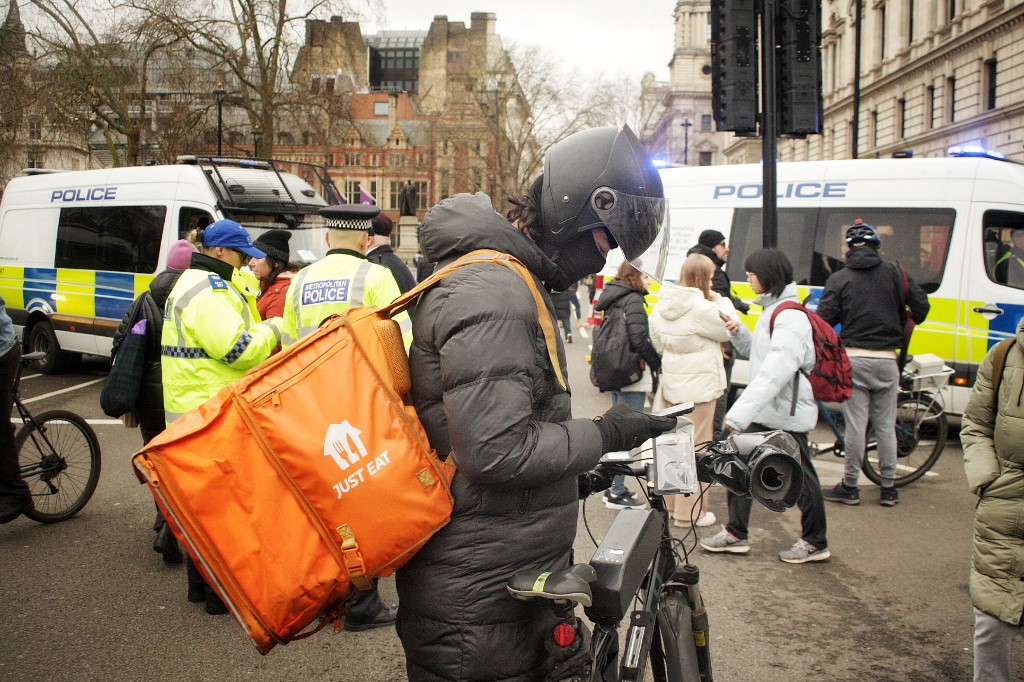
Migrants Buck Employment Rules, Working Under Different Names Without Permits
This form of illegal employment is rampant among food delivery companies. Already accredited drivers and couriers pass on their work to newly arrived migrants without work permits.
This form of illegal employment is mainly present among food delivery companies. Already accredited drivers and couriers are ‘subletting’ their work to newly arrived migrants who do not yet have the right to work.. The British government wants to put an end to this practice. Already in 2022, several migrants working as bicycle couriers in the French capital confirmed to InfoMigrants French that in France, it was common for fresh arrivals who wanted to work to “rent” a registered identity from an acquaintance, meaning they worked under that person’s work permit.
This arrangement, reportedly available for £40 (about €47) per week, enables some asylum seekers to start working as food delivery couriers “within hours” of arriving in the UK.
GB News reports.
Those applying for international protection in the UK are not allowed to work during their first 12 months of residence or while their asylum application is being processed. If they work without papers, both the employee and the employer can face criminal prosecution and fines, with employers facing up to five years in prison. Workers who break the law can expect to be deported from the UK and may receive a re-entry ban.
In 2024, fines for illegal employment tripled under laws introduced by the previous Conservative government. In its guidelines, the British government states that “all employers are responsible for avoiding illegal employment” by conducting “simple right-to-work checks.”
According to reports from the BBC and The Sun, the sub-letting arrangement was discovered in dozens of online forums where legal riders were offering to „lease” their accounts. The news prompted Chris Philip, the Conservative shadow home secretary, to visit a London asylum shelter, where he claimed to have seen evidence of people working unauthorized for various food delivery apps.
„Following an increase in immigration offences by gig workers in the region, Home Office teams have stepped up action to tackle illegal working and this week arrested drivers working for companies including Deliveroo, JustEat and UberEats,”
the government press release said, detailing that some of the arrests „were for offences including illegal working and possession of false documentation,” and that
„the operation also led to the seizure of weapons and cash suspected of being linked to criminal activity.”
In March, the government announced a new directive requiring companies hiring people in the gig economy will now be legally required to carry out checks confirming that anyone working in their name is eligible to work in the UK, bringing them in line with employers in other sectors.
Is Enforcement the Solution?
This shift in employment policy means that for the first time, this verification requirement will extend beyond traditional employment sectors to food delivery, construction, beauty services, and courier work.
These immigration checks are already standard for conventional employers but have been largely absent in the flexible gig economy, where individuals are typically employed under short-term contracts or in projects — so-called gigs.
Firms that fail to carry out these checks could face severe penalties—including fines of up to 60,000 pounds (70,000 euros) per unauthorized worker, business closures, director disqualifications, and even prison sentences of up to five years.
The move aims to crack down on illegal working, which undermines wages and undercuts law-abiding businesses.
Organizations protecting workers’ rights have sharply criticized the government’s new right-to-work law. Worker Info Exchange, a campaign group and civil organization advocating for transparency in the gig economy, has strongly criticized both the Home Office and food delivery companies, stating that the intentional exploitation of vulnerable workers by platform employers has characterized the UK gig economy for years.
The UK’s illegal labor market is estimated to employ 1.7 million people by 2024. An April report found that among couriers and freelancers, one in six adults in the UK performs illegal work at least once a week.

